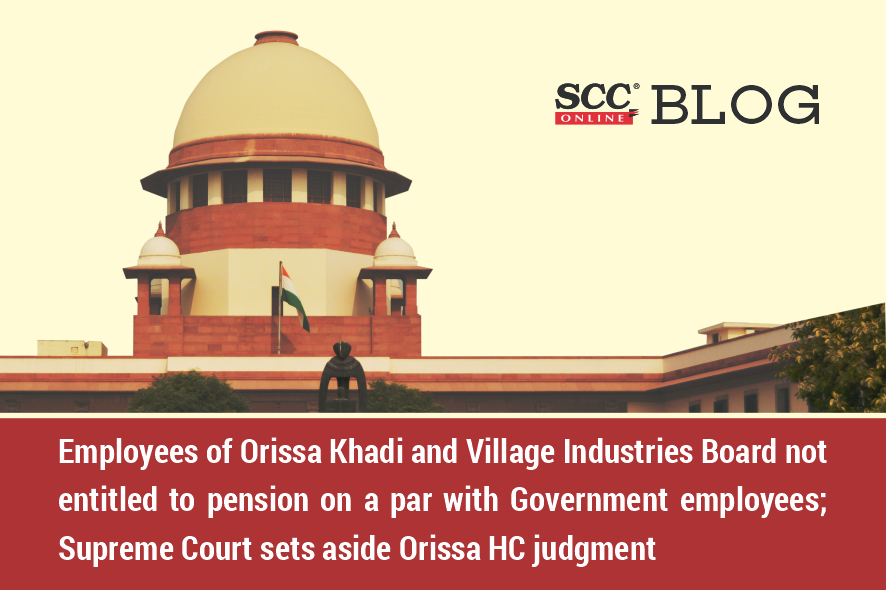Supreme Court: In an appeal against the judgment and order of the Orissa High Court, wherein the Court has dismissed the intra-court appeal filed by the State of Orissa and has affirmed the order in passed by the Single Judge of the High Court, holding the employees of the Orissa Khadi and Village Industries Board entitled to pension on a par with the Government employees and directing the State Government to amend the applicable regulations accordingly, the division bench of Dinesh Maheshwari* and Sanjay Kumar, JJ. sets aside the impugned judgment and order and said that Orissa Khadi and Village Industries Board Regulations, 1960 (‘Regulations, 1960’) governing the service conditions of the employees of the Board specifically contain the stipulation in Regulation 52 that they shall not be entitled to pension. The decisions cited by the respondents cannot be read as overriding to the said Regulation 52.
The State contended that the High Court was not justified in issuing directions contrary to the applicable regulations, which rule out pensionary rights to the employees of the Board in specific terms; and when the provisions contained in the regulations were neither under challenge nor were declared invalid.
The Court observed that the principles enunciated in the decisions cited by the respondents, that pension is neither a charity nor a bounty nor a gratuitous payment but, is earned for past services rendered; and that non-availability of financial resources cannot be a defence by the Government or any of its agencies or instrumentalities in taking away vested right accrued to the employees, are neither of any doubt nor of any dispute. However, the Court while adverting the question about applicability of these principles to the case at hand, examined the relevant observations and expositions in the cited decisions.
The Court said that in Haryana State Minor Irrigation Tubewells Corpn. v. G.S. Uppal, (2008) 7 SCC 375 and Punjab State Coop. Agricultural Development Bank Ltd. v. Coop. Societies, (2022) 4 SCC 363, where this Court frowned upon denial of pension, the right to receive the same was found flowing from the applicable rules and the service conditions. The said decisions cannot be weighed to mean that pension is required to be granted as a matter of right even if prescription to the contrary is found in the rules and/or service conditions.
Further, it viewed that a reference to financial constraints by the Government while denying the prayer for retrospective amendment of Regulation 52 cannot be disapproved of, with reference to the decisions. A matter of denial of the revised pay scale to the employees who were otherwise treated on a par with those with the Government employees at the time of revision of pay scale, as in the Haryana State case (supra); or taking away vested rights accrued to the employees as in the Punjab State case (supra), cannot be imported to the present case where the Government was not agreeable to the proposed alteration of the service conditions of the Board’s employees with retrospective effect, i.e., with effect from 01-04-1976. It has not been a case of denial of any vested or accrued right of the employees of the Board.
The Court noted that the Orissa Khadi and Village Industries Board was established under the Orissa Khadi and Village Industries Board Act, 1955 with the aim and objective to organise, promote, develop, and regulate Khadi and Village Industries throughout the State of Orissa. Thus, even when the State has established the Board to carry out its obligations in terms of Article 43 of the Constitution of India, it cannot follow as a corollary that the employees of this body corporate have to be treated as State Government employees in all respects. Such a corollary proposition would practically amount to merging the Board with the State Government; rather making it one of the Departments of the Government.
Concerning the plea of the respondents that this Court may exercise the powers under Article 142 of the Constitution of India to fill the gaps and to provide for pensionary benefits to the employees of the Board to do complete justice, the Court observed that under Article 142, it cannot issue directions in violation of the statutory provisions; and sympathy or sentiment, by itself, cannot be a ground for passing an order beyond and contrary to the legal rights.
[State of Orissa v Orissa Khadi and Village Industries Board Karmachari Sangh, 2023 SCC OnLine SC 281, decided on 17-03-2023]
*Judgment authored by: Justice Dinesh Maheshwari.








Sir, we are employees of state government, as we get salary of state government Odisha., state government also admit in his Act that Board is a heads of Department of state government now it coming under MSME Department, Additional Secretary is the Administrative chief of the Board, here president of Board is like president
All the things passed out with the approval of president . A 15 numbers of selected committee are Board members. Government will follow the decision of committee where President is the chairman.
Till today we are getting salaries from state government, Odisha, state government also admit in this Act, Odisha khadi and village industries Board is a heads of Department.
Now Odisha khadi and village industries Board is coming under MSME Department, so the organization is coming under control of state government Odisha, Additional Secretary ,MSME is the heads of Department in administration, so we are also working in different, DIC/RiC as supervisor or DCO. Due to Administration control of Additional Secretary we are working there. So equal work and equal pay status, we are eligible to get salary and pension, which are our due. Therefore I pray before the authority to consider it. .
Copy submitted to Chief Minister for my grievance,to the allow Board .
Copy submitted to P. M
GRIEVANCE CELL for information and necessary action.